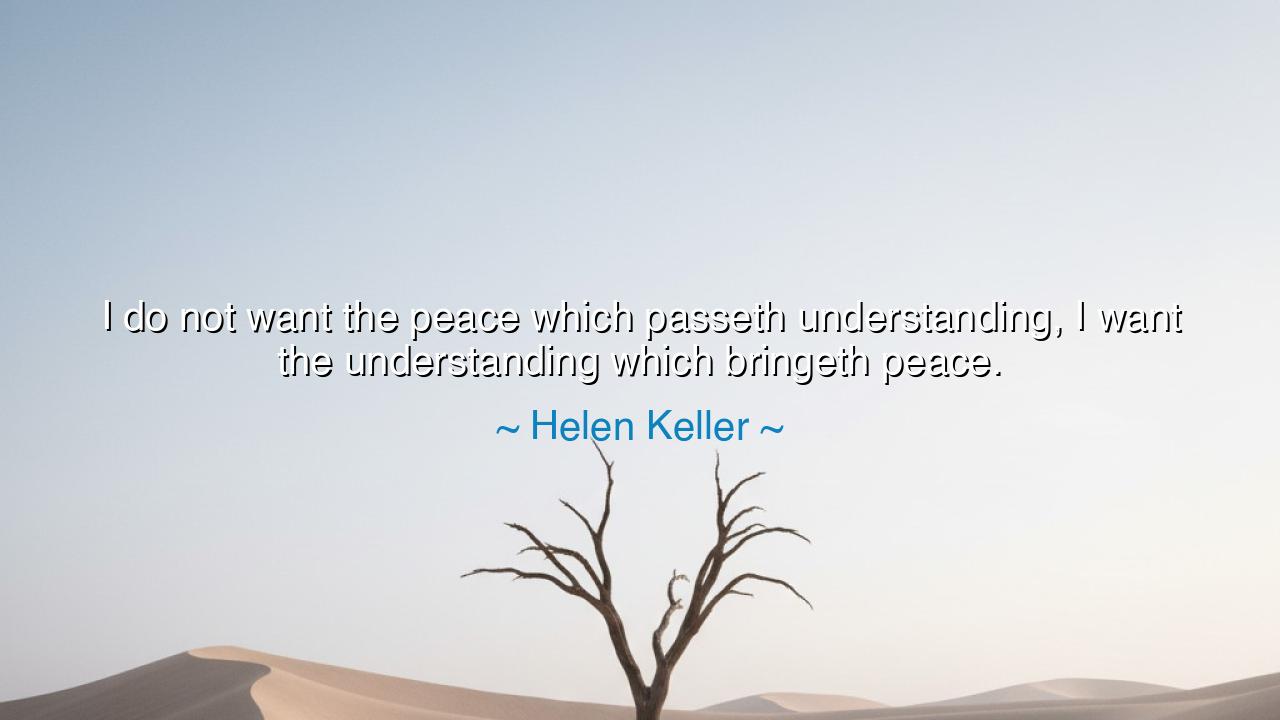
I do not want the peace which passeth understanding, I want the
I do not want the peace which passeth understanding, I want the understanding which bringeth peace.






In the voice of one who overcame silence and darkness, a deeper truth was spoken. So declared Helen Keller: “I do not want the peace which passeth understanding, I want the understanding which bringeth peace.” These words are radiant with power, for they come not from the lips of one who lived in comfort, but from a soul who dwelt in shadow and yet reached for the light. Her wisdom teaches us that true harmony is not found in mystery or in blind acceptance, but in knowledge, clarity, and compassion that unite minds and hearts.
The phrase “the peace which passeth understanding” was long celebrated in sacred scripture, describing a serenity so profound it surpasses human reason. Yet Helen, having fought her way out of isolation, desired not a peace that lay beyond comprehension, but a peace born of comprehension itself. For she knew that ignorance, misunderstanding, and blindness of the heart are the seeds of division. Only when men and women truly understand one another can they dwell together without fear.
Consider her life: deaf and blind from childhood, Helen could have remained locked in silence, cut off from the world. But through the patient hand of Anne Sullivan, she was given the gift of language—the gift of understanding. And with that gift, peace flooded into her soul. She no longer raged at her isolation, but found meaning, purpose, and connection. For her, understanding was not merely intellectual; it was salvation. It was the bridge that allowed her to enter the fellowship of humanity. Thus, her words are not philosophy alone, but lived truth.
History, too, bears witness to her insight. When the nations of Europe signed treaties without understanding after the First World War, they sowed resentment rather than reconciliation. Peace imposed without mutual comprehension proved fragile, and soon the world was hurled into another, greater conflict. Contrast this with the peace forged in the aftermath of the Second World War, where understanding—though imperfect—was sought through dialogue, rebuilding, and cooperation. Here, at last, peace endured longer, because it was not imposed from above but cultivated through shared vision.
Keller’s words remind us of a sacred law: peace cannot be imposed, nor can it descend as a mystery upon unwilling hearts. It must be built, brick by brick, with the mortar of empathy and the stones of understanding. Whether in nations or in families, conflict lingers where people do not strive to see the world through another’s eyes. To seek understanding is to disarm hatred at its root, to dissolve suspicion before it hardens into violence.
The lesson for us is clear: seek understanding before demanding peace. Do not silence disagreements by force or by avoidance. Instead, ask, “What do you feel? Why do you hurt? What do you hope for?” Listen deeply, not with the ear alone, but with the heart. In daily life, this means practicing patience in conflict, clarifying before judging, and extending compassion even to those who seem most unlike us. Only in this soil can peace grow strong and lasting.
Thus, Helen Keller’s wisdom becomes a commandment for generations: “I want the understanding which bringeth peace.” Let us not be content with a fragile stillness born of fear or submission. Let us seek the deeper, truer peace that comes when barriers of ignorance are broken, when eyes are opened, when hearts are willing to see each other clearly. For in that understanding lies not only harmony among men, but the very redemption of the human spirit.






AAdministratorAdministrator
Welcome, honored guests. Please leave a comment, we will respond soon